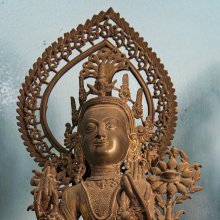Panci, Pāñcī, Pamci: 8 definitions
Introduction:
Panci means something in Buddhism, Pali, Hinduism, Sanskrit, Marathi, Tamil. If you want to know the exact meaning, history, etymology or English translation of this term then check out the descriptions on this page. Add your comment or reference to a book if you want to contribute to this summary article.
Alternative spellings of this word include Panchi.
Images (photo gallery)
In Buddhism
Mahayana (major branch of Buddhism)
Source: archive.org: Bulletin of the French School of the Far East (volume 5)Pañcī (पञ्ची) is the name of a Goddess appointed as one of the Divine protector deities of Tivani, according to chapter 17 of the Candragarbha: the 55th section of the Mahāsaṃnipāta-sūtra, a large compilation of Sūtras (texts) in Mahāyāna Buddhism partly available in Sanskrit, Tibetan and Chinese.—In the Candragarbhasūtra, the Bhagavat invites all classes of Gods and Deities to protect the Law [dharma?] and the faithful in their respective kingdoms of Jambudvīpa [e.g., the Goddess Pañcī in Tivani], resembling the time of the past Buddhas.

Mahayana (महायान, mahāyāna) is a major branch of Buddhism focusing on the path of a Bodhisattva (spiritual aspirants/ enlightened beings). Extant literature is vast and primarely composed in the Sanskrit language. There are many sūtras of which some of the earliest are the various Prajñāpāramitā sūtras.
Languages of India and abroad
Marathi-English dictionary
Source: DDSA: The Molesworth Marathi and English Dictionarypāñcī (पांची).—f (pāñca) A gold coin valuing five rupees.
--- OR ---
pāñcī (पांची).—ind (pāñca) The term used in multiplying unity by five. Ex. ēkē pāñcī pāñca.
Source: DDSA: The Aryabhusan school dictionary, Marathi-Englishpāñcī (पांची).—ind The term used in multiplying unity by five. Ex. ēkē pāñcī pāñca.
Marathi is an Indo-European language having over 70 million native speakers people in (predominantly) Maharashtra India. Marathi, like many other Indo-Aryan languages, evolved from early forms of Prakrit, which itself is a subset of Sanskrit, one of the most ancient languages of the world.
Sanskrit dictionary
Source: Cologne Digital Sanskrit Dictionaries: Monier-Williams Sanskrit-English Dictionary1) Pañci (पञ्चि):—[from pañca] a m. Name of a man (son of Nahuṣa), [Viṣṇu-purāṇa]
2) Pañcī (पञ्ची):—[from pañca] in [compound] for ca = can.
3) Pañci (पञ्चि):—b m. Name of a man, [Viṣṇu-purāṇa]
4) Pāñci (पाञ्चि):—[from pāñcāla] m. ([from] pañcan) a patronymic, [Śatapatha-brāhmaṇa] ([gana] pahv-ādi).
[Sanskrit to German]
Sanskrit, also spelled संस्कृतम् (saṃskṛtam), is an ancient language of India commonly seen as the grandmother of the Indo-European language family (even English!). Closely allied with Prakrit and Pali, Sanskrit is more exhaustive in both grammar and terms and has the most extensive collection of literature in the world, greatly surpassing its sister-languages Greek and Latin.
Kannada-English dictionary
Source: Alar: Kannada-English corpusPaṃci (ಪಂಚಿ):—[noun] the score of five in the game of chance played with dice.
--- OR ---
Paṃci (ಪಂಚಿ):—[noun] silly, stupid or useless talk.
Kannada is a Dravidian language (as opposed to the Indo-European language family) mainly spoken in the southwestern region of India.
Tamil dictionary
Source: DDSA: University of Madras: Tamil LexiconPañci (பஞ்சி) noun < pañji. [K. pañjikē, M. paññi.]
1. Cotton; பஞ்சதந்திரப் பாடற்ு. பஞ்சதந்திரப் பாடற்ிவெண்டிரிச் செஞ்சுடர் [panchu. panchivendiris senchudar] (குறுந்தொகை [kurundogai] 353).
2. Cotton cushion; பஞ்சாங்கம் சணை. புகழெனும் பஞ்சதந்திரப் பாடற்ிசேர்த்திப் பொலிவுறு பேரத் தாணி [panchangam sanai. pugazhenum panchiserthip polivuru perath thani] (சூடாமணிநிகண்டு சிறப்புப். [sudamaninigandu sirappup.] 6).
3. White cloth; வெண்டுகில். பஞ்சதந்திரப் பாடற்ியுங் களையாப்பருங்கலம் புண்ணர் [vendugil. panchiyung kalaiyap punnar] (புறநானூறு [purananuru] 353).
4. Red silk-cotton tree. See இலவு. செருக்கற்ற பஞ்சதந்திரப் பாடற்ிமலர்ச் சீறடி [ilavu. serukkarra panchimalars siradi] (சீவகசிந்தாமணி [sivagasindamani] 2339).
5. Cotton coloured with lac-dye; செவ்வரக்குச்சாயமிட்ட பஞ்சதந்திரப் பாடற்ு. பஞ்சதந்திரப் பாடற்ிமெல்லடி [sevvarakkuchayamitta panchu. panchimelladi] (தக்கயாகப்பரணி [thakkayagapparani] 33, உரை [urai]).
6. Anything loose or bushy, as cotton, down, etc.; சடைந்தது. [sadainthathu.] (W.)
7. Cotton-plant. See பருத்தி. [paruthi.]
8. Dense thicket; பெருந்தூறு. (சூடாமணிநிகண்டு) [perunthuru. (sudamaninigandu)]
--- OR ---
Pañci (பஞ்சி) noun perhaps from பஞ்சம்¹. [pancham¹.] (J.)
1. Difficulty, irksomeness; வருத்தம். [varutham.]
2. Repugnance to activity due to lassitude, laziness; சோம்பல். [sombal.]
--- OR ---
Pañci (பஞ்சி) noun < பஞ்சதந்திரப் பாடற்ிகை. [panchigai.] Almanac; பஞ்சதந்திரப் பாடற்ாங்கம். (யாழ்ப்பாணத்து மானிப்பாயகராதி) [panchangam. (yazhppanathu manippayagarathi)]
Tamil is an ancient language of India from the Dravidian family spoken by roughly 250 million people mainly in southern India and Sri Lanka.
See also (Relevant definitions)
Starts with (+20): Pamcidriya, Pamcikarisu, Pamcike, Pamcikriti, Pamcimdiya, Pamciya, Pancigrama, Pancika, Pancikam, Pancikar, Pancikaran, Pancikarana, Pancikaranam, Pancikaranamahavakyartha, Pancikaranamahavakyarthabodha, Pancikarananandakhya, Pancikarananandavyakhya, Pancikaranaprakriya, Pancikaranatatparyacandrika, Pancikaranavarttika.
Ends with: Caupamci, Cempanci, Irpamci, Latapatapanci, Marappanci, Nihprapamci, Prapanci, Vipanci.
Full-text (+26): Panji, Pancikrita, Pancittanakku, Pancikarana, Apancikrita, Vipanci, Panciyatar, Pancippatu, Panch, Pancikaranaviveka, Pancikritatika, Pancikaranavivarana, Pancikaranaprakriya, Pancigrama, Pancikaranamahavakyarthabodha, Pancikaranavarttika, Pancikaranavarttikabharana, Pancikaranatatparyacandrika, Pancikarananandakhya, Pancikaranamahavakyartha.
Relevant text
Search found 21 books and stories containing Panci, Pāñcī, Pañci, Pañcī, Pāñci, Pamci, Paṃci, Panchi, Panch, Panji; (plurals include: Pancis, Pāñcīs, Pañcis, Pañcīs, Pāñcis, Pamcis, Paṃcis, Panchis, Panches, Panjis). You can also click to the full overview containing English textual excerpts. Below are direct links for the most relevant articles:
A History of Indian Philosophy Volume 2 (by Surendranath Dasgupta)
Part 6 - Vedāntic Cosmology < [Chapter XI - The Śaṅkara School of Vedānta (continued)]
Part 7 - Śaṅkara and his School < [Chapter XI - The Śaṅkara School of Vedānta (continued)]
Influence of Women on Mulkraj Anand and < [April – June, 2005]
The Novels of < [October 1967]
India's Foreign Policy and Federalism < [April - June 1974]
Jain Science and Spirituality (by Medhavi Jain)
2. Ancient Jaina Texts < [Chapter 2 - Review of Literature]
The Devi Bhagavata Purana (by Swami Vijñanananda)
Lakulisha-Pashupata (Philosophy and Practice) (by Geetika Kaw Kher)
Kapalikas and Natha Siddhas < [Chapter 2 - Spread and Transition]
Jainism and Patanjali Yoga (Comparative Study) (by Deepak bagadia)
The four Siksavratas < [Chapter 3 - Jain Philosophy and Practice]
Part 8 - Celebrations/ Festivals, Prayers and Prime symbol in Jain traditions < [Chapter 3 - Jain Philosophy and Practice]
Six Avasyakas (essentials) < [Chapter 3 - Jain Philosophy and Practice]
Related products




